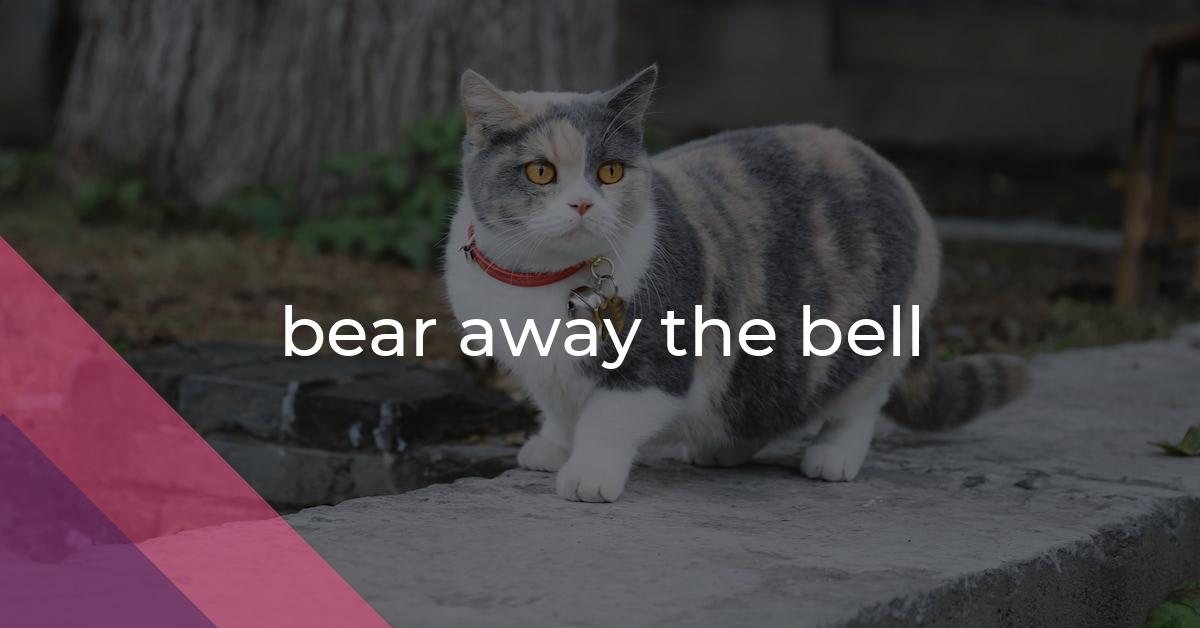bear away the bell: Idiom Meaning and Origin
What does ‘bear away the bell’ mean?
The idiom "bear away the bell" means to win a prize or be recognized as the best in a competition or contest.

Idiom Explorer
The idiom "lose the bell" means to cease or avoid drawing unnecessary attention or making oneself conspicuous.
The idiom "in the lead" means to be in a leading or winning position, often in a competition or race.
The idiom "interpret away" means to explain or rationalize something in a way that downplays or dismisses its importance or significance.
The idiom "hold the ring" means to be in control or to take charge of a situation or event.
The idiom "have the biscuit" means to achieve the highest level of excellence or to be the best at something. It is often used to describe someone who surpasses the expectations of others or outshines their competition.
The idiom "go far" means to achieve great success or make significant progress in one's endeavors or career.
The idiom "get the lead out" means to hurry up or move faster, often used as an expression to urge someone to stop procrastinating or to speed up their actions.
The idiom "get the better of" means to overcome or defeat someone or something in a competition, argument, or struggle.
The idiom "gather way" means to gain momentum or make progress. It is often used to describe a person or group becoming more successful or making significant strides in their endeavors.
Unveiling Hidden Origins
Originating in medieval Europe, the idiom "bear away the bell" finds its roots in bell-ringing competitions. These contests were popular during the Middle Ages and served as a platform for teams of bell-ringers to showcase their skills and compete for recognition. The bell itself symbolized victory and achievement in these competitions.
When a team or individual excelled and outshone their competitors, they were said to "bear away the bell." The phrase "bear away" denotes the act of carrying or taking something away, while "the bell" emphasizes the importance and prestige of winning. In essence, the idiom signifies triumph and accomplishment among a group of peers or competitors.
Over time, the usage of "bear away the bell" expanded beyond the realm of bell-ringing competitions. It gradually came to encompass any scenario where an individual stands out or achieves remarkable success among their peers or competitors. This versatile idiom can be applied to different contexts such as sports, academics, or professional accomplishments.
Although "bear away the bell" is more commonly used in British English, it is still recognized and understood by English speakers in the United States and other regions. The idiom embodies the idea of distinction, recognition, and excellence, inspiring individuals to strive for greatness and emerge as the standout within their respective fields.
The metaphorical usage of "bear away the bell" allows it to transcend its origins while still retaining its historical and cultural significance. The idiom not only reflects the traditions and practices associated with bell-ringing contests but also serves as a timeless symbol for achieving prominence and receiving accolades.
Exploring the depths of "bear away the bell" unveils the rich tapestry of historical and cultural heritage from which idioms emerge. While the specific details of its origin might be elusive, the metaphorical power and resonance of this idiom continue to captivate and inspire. It serves as a reminder of the intricacies of language and the fascinating stories that have shaped our collective linguistic heritage.
Related to the idiom "bear away the bell" are two other idioms, namely "lose the bell" and "bell the cat." These idioms encompass similar themes of competition, distinction, and risk.
"Lose the bell" refers to a situation where someone who was once at the forefront or seen as the best in a particular field or domain falls behind or loses their prominence. It signifies a loss of one's previously held position or recognition. This idiom reflects the transient nature of success and the need for consistent effort and improvement to maintain one's standing.
"Bell the cat" originates from a fable known as "The Mice in Council." In this tale, a group of mice seek to curb the threat posed by a cat by fitting it with a bell. However, the challenge lies in executing this plan, as it requires one brave mouse to take the risk of placing the bell around the cat's neck. Thus, "bell the cat" conveys the idea of undertaking a daunting task or assuming a leadership role that involves significant risk.
These related idioms provide additional understanding and depth to the concept of "bearing away the bell." They highlight the dynamic nature of success, the possible loss of prominence, and the courage required to take on challenges in pursuit of distinction.
Example usage
Examples of how the idiom "bear away the bell" can be used in a sentence:
- After a close competition, John managed to bear away the bell and win the singing competition.
- In the final round, the experienced team was able to bear away the bell and secure the victory.
- Despite facing tough opponents, the underdog team unexpectedly bore away the bell and emerged as the champions.
More "Expressions" idioms



